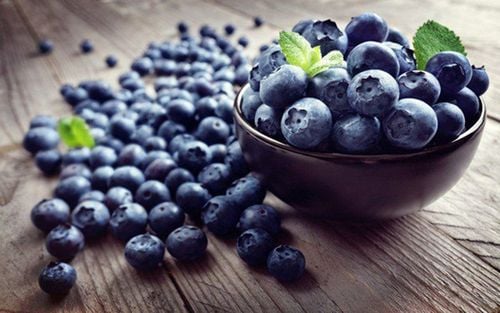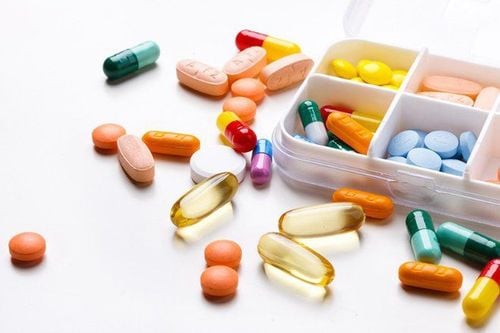This is an automatically translated article.
Providing the body with the nutrients it needs is important for everyone. When combined with exercise and maintaining a healthy weight, eating right is a great way to keep your body strong and healthy. If you are currently being treated for breast cancer or have been treated for breast cancer in the past, eating well is especially important for you. In this section, you can read about nutrition recommendations for breast cancer patients, healthy eating, and what and how to eat during and after treatment.1. Breast cancer and food for people with breast cancer
Breast cancer is the most common cancer in women, especially invasive breast cancer, when statistics show that one in eight American adult women will develop this type of breast cancer during their lifetime. their life. It even occurs in men, although male breast cancer accounts for less than 1% of all breast cancers.DNA damage and mutations in the BRCA gene can cause this disease. Inheriting certain genes, such as BRCA1 and BRCA2, can also increase your risk of breast cancer, as well as being overweight or obese.
Lifestyle also plays an important role, with research linking heavy drinking, smoking, exposure to estrogen and certain dietary patterns - including the Western diet high in processed foods with an increased risk of breast cancer.
Notably, studies link other eating patterns such as the Mediterranean diet with a reduced risk of breast cancer. What's more, specific foods may even protect against the disease.
2. Breast cancer and diet: 10 foods to eat
Remember that many factors are involved in the development of breast cancer. While improving your diet can improve your overall health and reduce your overall cancer risk, that's only part of the problem.Even with a healthy diet, we still need regular breast cancer screenings like mammograms and manual exams. This is extremely important, early detection and diagnosis greatly increase the survival rate.
Similarly, many studies also show that there are certain foods that can reduce the risk of this disease.
2.1. Green Leafy Vegetables Kale, arugula, spinach, collard greens, and bok choy are just some of the green leafy vegetables that may have cancer-fighting properties. Green leafy vegetables contain carotenoid antioxidants, including beta carotene, lutein and zeaxanthin, all of which have the potential to reduce the risk of cancer in general and breast cancer in particular.
An analysis based on the results of 8 studies involving 7,000 people found that women with higher levels of carotenoids had a significantly reduced risk of breast cancer compared with women with lower levels. Likewise, a follow-up study of 32,000 women linked higher levels of total carotenoids in the blood to an 18 to 28 percent lower risk of breast cancer, as well as a lower risk of recurrence and death. in people who have had breast cancer. What's more, research shows that high amounts of folate, a B vitamin concentrated in green leafy vegetables, may protect against breast cancer.
2.2. Citrus fruits Citrus fruits are full of compounds that may protect against breast cancer, including folate (vitamin B9), vitamin C and carotenoids like beta cryptoxanthin and beta carotene, along with antioxidants antioxidant flavonoids such as quercetin, hesperetin and naringenin. These nutrients will provide antioxidant, anti-cancer and anti-inflammatory effects.
In fact, research shows that citrus fruit helps reduce the risk of many cancers, including breast cancer. A review of six studies involving 8,000 people found that a high intake of citrus fruits reduced the risk of breast cancer by 10%.
Citrus fruits include oranges, grapefruits, lemons, limes and tangerines.

Các loại trái cây có múi là loại thực phẩm tốt cho bệnh nhân ung thư vú
Some studies show that eating fatty fish in particular can reduce the risk of breast cancer. A large analysis based on the results of 26 studies in 883,000 people found that those who ate the most omega-3 sources from seafood had a 14% reduced risk of breast cancer, compared with those who ate the least. this fish. Other studies have reported similar findings
Balancing the ratio of omega-3 to omega-6 by eating more fatty fish and low in refined oils and processed foods can help reduce cancer risk our breast.
2.4. Berries Regularly enjoying berries can help reduce your risk of certain cancers, including breast cancer. The antioxidants found in berries, including flavonoids and anthocyanins, have been shown to protect against cell damage, as well as the growth and spread of your cancer cells.
Notably, a study in 75,929 women linked eating more berries – and especially blueberries – with a lower risk of estrogen receptor-negative (ER−) breast cancer.
2.5. Fermented foods
Fermented foods, such as yogurt, kimchi, miso and sauerkraut contain probiotics and other nutrients that may protect against breast cancer.
A results-based review of 27 studies have linked fermented dairy products, such as yogurt and kefir, with a reduced risk of breast cancer in Western and Asian populations.
Animal studies have shown that this protective effect is related to the immune-enhancing effects of some probiotics.
2.6. Allium vegetables Garlic, onions, and leeks are all nutrient-rich allium vegetables, including organosulfur compounds, flavonoid antioxidants, and vitamin C. They may have potent cancer-fighting properties. strong.
A study in 660 women in Puerto Rico found that eating more garlic and onions reduced the risk of breast cancer. Likewise, a study in 285 women found that a high intake of garlic and leeks may protect against breast cancer. However, research has noted a positive association between high consumption of cooked onions and breast cancer.
2.7. Peaches, apples and pears Fruits - especially peaches, apples and pears - have been shown to be protective against cancer in general and breast cancer in particular.
In a study in 75,929 women, those who consumed as little as 2 servings of peaches per week reduced their risk of developing ER – breast cancer by up to 41%. Interestingly, one test-tube study revealed that the polyphenol antioxidant found in peaches inhibited growth and spread in a breast cancer cell line.
Furthermore, a study analyzing data in 272,098 women linked apple and pear intake with a lower risk of breast cancer.
2.8. Cruciferous vegetables Cruciferous vegetables, including cauliflower, cabbage and broccoli, may help reduce the risk of breast cancer. Cruciferous vegetables contain compounds called glucosinolates, which your body can convert into molecules called isothiocyanates. They have significant anti-cancer potential. Notably, a study of 1,493 women linked a higher total cruciferous vegetable intake with a reduced risk of breast cancer.
2.9. Beans Beans contain a lot of fiber, vitamins and minerals. Specifically, their high fiber content may protect against breast cancer. One study in 2,571 women found that eating a lot of beans reduced the risk of breast cancer by 20%, compared with eating less beans.
Bệnh nhân ung thư vú nên bổ sung đậu vào khẩu phần ăn của mình
2.10. Herbs and spices Herbs and spices such as parsley, rosemary, oregano, thyme, turmeric, curry, and ginger contain plant compounds that may help protect against cancer breast letter. These include vitamins, fatty acids and polyphenol antioxidants.
For example, oregano boasts the antioxidants carvacrol and rosmarinic acid, which in vitro studies have also found to have significant anticancer effects against aggressive breast cancer cell lines . Curcumin, the main active compound in turmeric, has also demonstrated significant anti-cancer properties, as has apigenin, a flavonoid concentrated in parsley. Since many other herbs and spices also have powerful cancer-fighting effects, it's a good idea to include a variety of herbs in your diet.
3. Nutritional recommendations for breast cancer patients
While some foods may protect against breast cancer risk, other foods may increase the risk. Therefore, it is best to reduce your intake of the following foods and drinks - or avoid them altogether:Alcohol. Alcohol use, especially with heavy drinking, significantly increases the risk of breast cancer. Fast food. Eating fast food regularly has been linked to many serious health problems, including an increased risk of metabolic cardiovascular disease, diabetes, obesity, and breast cancer. Fried food. Research shows that a diet high in fried foods can significantly increase the risk of breast cancer. Indeed, in a study of 620 Iranian women, eating fried food was the biggest risk factor for developing breast cancer. Processed meats. Processed meats such as bacon and hot dogs may increase the risk of breast cancer. An analysis of 15 studies linked a high intake of processed meat with a 9% higher risk of breast cancer. Add sugar. A diet high in added sugars can significantly increase breast cancer risk by increasing inflammation and the expression of certain enzymes involved in cancer growth and spread. Refined carbs. Diets high in refined carbs, including the typical Western diet, are likely to increase breast cancer risk. Try replacing refined carbs, such as white bread and sugary baked goods, with whole grain products and nutrient-rich vegetables. One thing is for sure, your diet can help prevent chronic diseases, including breast cancer. However, many other lifestyle choices can also affect your cancer risk.
For example, regular exercise, adequate rest and not smoking provide significant protection against breast cancer. Maintaining a healthy body weight can help reduce your risk of disease. What's more, some studies suggest that certain skin care products may increase the risk of breast cancer. For example, antiperspirant use has been linked to an increased risk of breast cancer, although more research is needed.
Bệnh nhân ung thư vú nên hạn chế sử dụng rượu, đồ uống có cồn
Remember that routine checkups and breast cancer screenings are important for early detection and diagnosis. Talk to your doctor if you have any questions about your breast cancer risk or the screening process.
Eating a nutritious diet rich in green vegetables, fatty fish, citrus fruits, beans, berries and certain herbs and spices can help reduce your risk of breast cancer . It is equally important to cut out sugary drinks, processed meats, fried foods and alcohol. Overall, cancer risk is complex but certainly influenced by your diet. Be sure to talk to your doctor about abnormalities in your breasts and regularly screen to ensure early detection of breast cancer.
Please regularly follow Vinmec website (www.vinmec.com) to update useful health care information and leave information when you need medical advice and support!
Please dial HOTLINE for more information or register for an appointment HERE. Download MyVinmec app to make appointments faster and to manage your bookings easily.
References: healthline.com, doctorsfornutrition.org, medicalnewstoday.com



